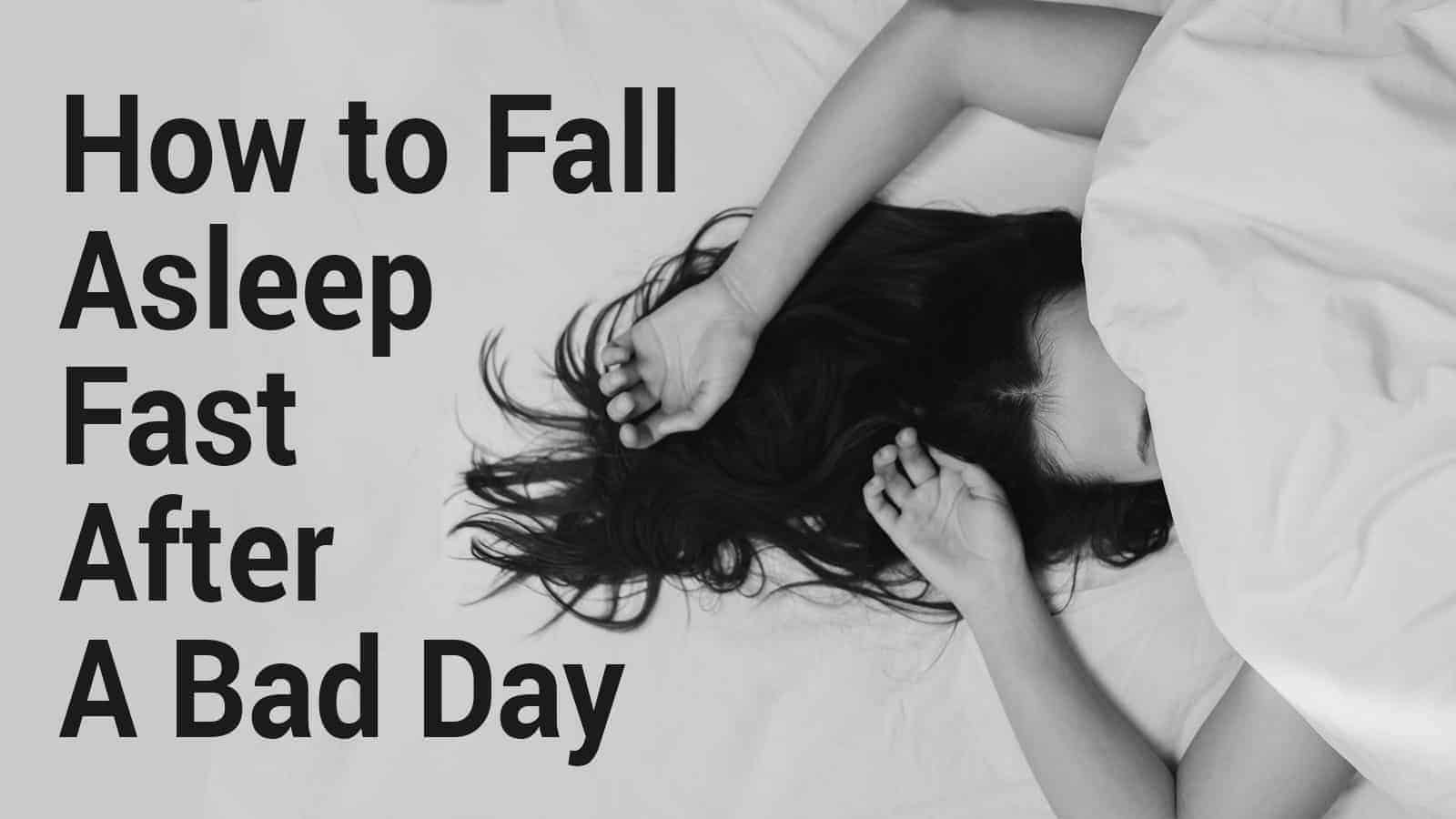Ever had a stress-filled day and wondered how to fall asleep despite the continual replay looping through your brain?
Let’s face it. The older we become, the more elusive sleep seems to grow! Even young adults are working long hours and coming home to disrupted sleep patterns. Often, this is the result of stress and an inability to “leave work at work.” Ironically, there are also times when we are unable to sleep, no matter how tired we might be!
Although you might feel you should take a sleeping aid, you should first try some natural methods by which to go to sleep and stay asleep – even after an especially stressful day at the office.
Why Do We Need Sleep?
Sleep is the time when our bodies repair and restore themselves. Good sleep will help you to operate at your maximum potential. Your mind will be at its sharpest after the proper amount of sleep (regularly, that is).
A lack of proper sleep over time can cause weight gain, emotional issues, and can negatively affect your ability to learn. While not all of us need exactly eight hours every single night, we do need to get between six and eight hours every night regularly.
That means we can’t skimp on sleep all week only to catch up on the weekends, but we’ll address that later.
1 – Lower the Temperature in the Room
A cooler room leads to better sleep, according to a number of studies.
Your core body temperature falls when you are asleep while the temperature in your hands and feet goes up. If your room is too warm, then you will likely have difficulty falling and staying asleep. Experts advise keeping your room temperature between sixty and seventy-five degrees, but you should find the temperature that works best for you.
 2 – Meditate Before Bed
2 – Meditate Before Bed
Adopt breathing methods that allow your body to calm down and relax before bed. One way highly recommended is the “4-7-8” method.
(BONUS TIP: Anytime you feel anxious, you can use this breathing pattern to calm yourself.)
- Place the tip of your tongue behind your top front teeth. Next, exhale from your mouth so that it seems you’re making a “whoosh” sound.
- Close your mouth and inhale; count to four (mentally) as you do this.
- Repeat opening your mouth and exhaling, but this time count to eight. Repeat as needed.
When you meditate before bed, especially after a bad day, you’ll learn how to fall asleep once you’ve let go of your stressful day.
3 – Start and Stay on a Schedule
Remember earlier we talked about getting roughly the same amount of sleep every night, even on the weekends? This behavior puts you on a schedule.
Many young people work long hours during the week, getting less than five hours of sleep each weeknight. On the weekends, they sleep in – sometimes for ten or more hours. This practice is quite unhealthy, and it doesn’t “even out” one’s lack of sleep, no matter how it looks.
You should try to go to bed and wake up roughly the same time every day. While you can sleep an extra hour on weekends, do not allow yourself to go over ninety minutes of the time you regularly wake.
This routine keeps your body on a schedule, and you’ll get more restful sleep if you can maintain this sleep schedule.
4 – Get your Circadian Rhythms Flowing Properly
Your circadian rhythms are highly essential to get the proper amount of sleep. Getting on a sleep schedule is just one step in making those rhythms function correctly.
Light also plays a massive role in how our circadian rhythms ebb and flow. (Ever wonder why it’s so tricky for night shift workers to get proper sleep? This explanation is why!)
Our bodies should be awake during the day – when it’s light outside – and asleep at night when it’s dark. However, our current work schedules typically keep us inside during the day. Some of us may even leave for work before daylight, and we might not return until almost nighttime!
Sleep experts recommend going outdoors and taking in natural, bright sunlight at least two or three times per day. Go out on your breaks, or take a brisk walk during your lunch hour and enjoy the sunshine.
At night, keep your room as dark as possible. Keep light out of your room – that means you might need to forgo an alarm clock with a light, and you might need to cover the bottom of your door if it allows light to come into your room.
Utilize room-darkening curtains too. Make sure your body understands you’ve been wide awake during the daylight hours, and you are trying to sleep when it is dark.
5 – Forgo That Temptation to Nap During the Day
Although you are likely so sleepy that you can barely hold your head up, especially if you’ve been missing sleep at night, do not fall into the temptation of taking a nap. When you take a nap, you are only really worsening your chances of sleeping well at night.
This is particularly true if you take a nap longer than two hours late in the afternoon.
Surprisingly, this is especially true for college-aged students and for older adults. When considering how to fall asleep and stay asleep, one easy way to promote better sleep habits is to simply avoid long afternoon naps late in the day.
Furthermore, those who were overweight tended to fall into the group of people who took naps during the day.
6 – Your Eating Habits Can Also Affect How you Sleep
When counseling people of all ages on how to fall asleep and stay asleep, doctors often suggest that eating habits play a role in how well someone sleeps at night.
Furthermore, it isn’t just WHEN you eat, but WHAT you eat that can be detrimental to your sleep patterns.
Never eat anything with lots of carbs before you go to bed. While this might help you get to sleep, you won’t sleep well. Your body will be too “busy” digesting this food, and you won’t get that deep, restorative sleep your body so desperately needs.
You should opt for a meal that is high in healthy fats a few hours before bed. Indeed, you should eat dinner three to four hours before bedtime. If your meal is high in carbs, keep that time closer to four hours before bed so that your body has ample time to digest the heavy meal.
So remember–you shouldn’t eat immediately before bed if you can help it.
7 – Create a Bedtime Routine
Just as setting a sleep schedule is important in how to fall asleep and stay asleep, you must also create a routine prior to bed that signals to your body that it is time to slow down and get ready for bed.
We’ve already discussed how to fall asleep using meditation, and some people will make that habit a part of their nightly routine to induce sleep. Here are two additional helpful ideas.
Take a warm bath.
You receive bonus points for adding lavender oil to the water. The warm bath helps you to relax, particularly after a hard day. This signals to your body that time to rest is coming soon.
Listen to calming music.
Some doctors recommend soothing music as one way how to fall asleep and stay asleep. Patients in a study who listened to calming music for at least 45 minutes prior to bedtime not only went to sleep smoothly but stayed asleep and got restful sleep too.
8 – Exercise During the Day. Do Not Exercise at Night
When we tell people how to fall asleep and stay asleep, they are often surprised that we recommend exercise ONLY during the day. In fact, if you’re wondering how to fall asleep and stay asleep at night, you should never exercise just prior to bed.
If you exercise in the afternoon or even early evening, you won’t get the best effects as far as falling and staying asleep are concerned.
Exercise early in the morning to lower your cortisol levels and boost serotonin production at the right time of the evening. You’ll see early-day exercise is one way how to fall asleep and stay asleep longer.
9 – Invest in Your Bed if Necessary
Do you wake up sore and stiff? Do you wake from pain at night? You may need to invest in a better mattress and pillow. The quality of your mattress and bedding is linked directly to your sleep quality.
While your mattress may be just fine, you may have to invest in a proper pillow. An orthopedic pillow may be key to falling asleep and staying asleep.
Experts say a medium-soft mattress is typically the best kind to get a proper night’s sleep on.
 Final Thoughts on Mastering the Art of How to Fall Asleep
Final Thoughts on Mastering the Art of How to Fall Asleep
Sleep may seem elusive right now. But if you carefully implement these ideas into your daily routine, you’ll find how to fall asleep and stay asleep without ever needing to consider drastic measures such as medication. Sweet dreams!



















